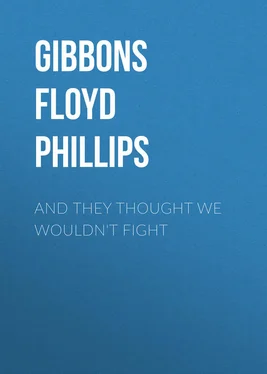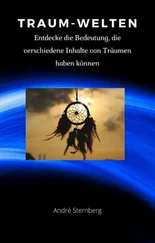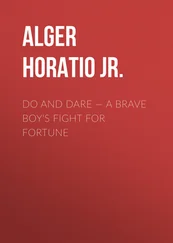Floyd Gibbons - And they thought we wouldn't fight
Здесь есть возможность читать онлайн «Floyd Gibbons - And they thought we wouldn't fight» — ознакомительный отрывок электронной книги совершенно бесплатно, а после прочтения отрывка купить полную версию. В некоторых случаях можно слушать аудио, скачать через торрент в формате fb2 и присутствует краткое содержание. Издательство: Иностранный паблик, Жанр: История, foreign_antique, foreign_prose, на английском языке. Описание произведения, (предисловие) а так же отзывы посетителей доступны на портале библиотеки ЛибКат.
- Название:And they thought we wouldn't fight
- Автор:
- Издательство:Иностранный паблик
- Жанр:
- Год:неизвестен
- ISBN:нет данных
- Рейтинг книги:4 / 5. Голосов: 1
-
Избранное:Добавить в избранное
- Отзывы:
-
Ваша оценка:
- 80
- 1
- 2
- 3
- 4
- 5
And they thought we wouldn't fight: краткое содержание, описание и аннотация
Предлагаем к чтению аннотацию, описание, краткое содержание или предисловие (зависит от того, что написал сам автор книги «And they thought we wouldn't fight»). Если вы не нашли необходимую информацию о книге — напишите в комментариях, мы постараемся отыскать её.
And they thought we wouldn't fight — читать онлайн ознакомительный отрывок
Ниже представлен текст книги, разбитый по страницам. Система сохранения места последней прочитанной страницы, позволяет с удобством читать онлайн бесплатно книгу «And they thought we wouldn't fight», без необходимости каждый раз заново искать на чём Вы остановились. Поставьте закладку, и сможете в любой момент перейти на страницу, на которой закончили чтение.
Интервал:
Закладка:
Our soldiers manifested naïve interest in some of England's most revered traditions and particularly in connection with historical events related to the Tower of London. On the second day of their occupation of this old fortress, one of the warders, a "Beef-eater" in full mediæval regalia, was escorting a party of the Yanks through the dungeons.
He stopped in one dungeon and lined the party up in front of a stone block in the centre of the floor. After a silence of a full minute to produce a proper degree of impressiveness for the occasion, the warder announced, in a respectful whisper:
"This is where Anne Boleyn was executed."
The lined-up Yanks took a long look at the stone block. A silence followed during the inspection. And then one regular, desiring further information, but not wishing to be led into any traps of British wit, said:
"All right, I'll bite; what did Annie do?"
Current with the arrival of our men and their reception by the honour guard of the Welsh Fusiliers there was a widespread revival of an old story which the Americans liked to tell in the barrack rooms at night.
When the Welsh Fusiliers received our men at the dock of Liverpool, they had with them their historical mascot, a large white goat with horns encased in inscribed silver. The animal wore suspended from its neck a large silver plate, on which was inscribed a partial history of the Welsh Fusiliers.
Some of these Fusiliers told our men the story.
"It was our regiment – the Welsh Fusiliers," one of them said, "that fought you Yanks at Bunker Hill. And it was at Bunker Hill that our regiment captured the great-great-granddaddy of this same white goat, and his descendants are ever destined to be the mascot of our regiment. You see, we have still got your goat."
"But you will notice," replied one of the Yanks, "we've got the hill."
During the four days in London, General Pershing was received by King George and Queen Mary at Buckingham Palace. The American commander engaged in several long conferences at the British War Office, and then with an exclusion of entertainment that was painful to the Europeans, he made arrangements to leave for his new post in France.
A specially written permission from General Pershing made it possible for me to accompany him on that historic crossing between England and France. Secret orders for the departure were given on the afternoon and evening of June 12th. Before four o'clock of the next morning, June 13th, I breakfasted in the otherwise deserted dining-room of the Savoy with the General and his staff.
Only a few sleepy-eyed attendants were in the halls and lower rooms of the Savoy. In closed automobiles we were whisked away to Charing Cross Station. We boarded a special train whose destination was unknown. The entire party was again in the hands of the Intelligence Section of the British Admiralty, and every possible means was taken to suppress all definite information concerning the departure.
The special train containing General Pershing and his staff reached Folkstone at about seven o'clock in the morning. We left the train at the dockside and boarded the swift Channel steamer moored there. A small vociferous contingent of English Tommies returning to the front from leave in "Blighty" were crowded on all decks in the stern.
With life-boats swinging out over the side and every one wearing life-preservers, we steamed out of Folkstone harbour to challenge the submarine dangers of the Channel.
The American commander occupied a forward cabin suite on the upper deck. His aides and secretaries had already transformed it into a business-like apartment. In the General's mind there was no place or time for any consideration of the dangers of the Channel crossing. Although the very waters through which we dashed were known to be infested with submarines which would have looked upon him as capital prey, I don't believe the General ever gave them as much as a thought.
Every time I looked through the open door of his cabin, he was busy dictating letters to his secretaries or orders or instructions to his aides or conferring with his Chief of Staff, Brigadier General Harbord. To the American commander, the hours necessary for the dash across the Channel simply represented a little more time which he could devote to the plans for the great work ahead of him.
Our ship was guarded on all sides and above. Swift torpedo destroyers dashed to and fro under our bow and stern and circled us continually. In the air above hydro-airplanes and dirigible balloons hovered over the waters surrounding us, keeping sharp watch for the first appearance of the dark sub-sea hulks of destruction.
We did not learn until the next day that while we were making that Channel crossing, the German air forces had crossed the Channel in a daring daylight raid and were at that very hour dropping bombs on London around the very hotel which General Pershing had just vacated. Some day, after the war, I hope to ascertain whether the commander of that flight of bombing Gothas started on his expedition over London with a special purpose in view and whether that purpose concerned the supposed presence there of the commander-in-chief of the American millions that were later to change the entire complexion of the war against Germany.
It was a beautiful sunlight day. It was not long before the coast line of France began to push itself up through the distant Channel mists and make itself visible on the horizon. I stood in the bow of the ship looking toward the coast line and silent with thoughts concerning the momentousness of the approaching historical event.
It happened that I looked back amidships and saw a solitary figure standing on the bridge of the vessel. It was General Pershing. He seemed rapt in deep thought. He wore his cap straight on his head, the visor shading his eyes. He stood tall and erect, his hands behind him, his feet planted slightly apart to accommodate the gentle roll of the ship.
He faced due east and his eyes were directed toward the shores of that foreign land which we were approaching. It seemed to me as I watched him that his mind must have been travelling back more than a century to that day in history when another soldier had stood on the bridge of another vessel, crossing those same waters, but in an almost opposite direction.
It seemed to me that he must have been thinking of that historical character who made just such a journey more than a hundred years before, – a great soldier who left his homeland to sail to other foreign shores halfway around the world and there to lend his sword in the fight for the sacred principles of Democracy. It seemed to me that day that Pershing thought of Lafayette.
As we drew close to the shore, I noticed an enormous concrete breakwater extending out from the harbour entrance. It was surmounted by a wooden railing and on the very end of it, straddling the rail, was a small French boy. His legs were bare and his feet were encased in heavy wooden shoes. On his head he wore a red stocking cap of the liberty type. As we came within hailing distance, he gave to us the first greeting that came from the shores of France to these first arriving American soldiers.
" Vive l'Amérique! " he shouted, cupping his hands to his mouth and sending his shrill voice across the water to us. Pershing on the bridge heard the salutation. He smiled, touched his hand to his hat and waved to the lad on the railing.
We landed that day at Boulogne, June 13th, 1917. Military bands massed on the quay, blared out the American National Anthem as the ship was warped alongside the dock. Other ships in the busy harbour began blowing whistles and ringing bells, loaded troop and hospital ships lying nearby burst forth into cheering. The news spread like contagion along the harbour front.
As the gangplank was lowered, French military dignitaries in dress uniforms resplendent with gold braid, buttons and medals, advanced to that part of the deck amidships where the General stood. They saluted respectfully and pronounced elaborate addresses in their native tongue. They were followed by numerous French Government officials in civilian dress attire. The city, the department and the nation were represented in the populous delegations who presented their compliments, and conveyed to the American commander the of the entire people of France.
Читать дальшеИнтервал:
Закладка:
Похожие книги на «And they thought we wouldn't fight»
Представляем Вашему вниманию похожие книги на «And they thought we wouldn't fight» списком для выбора. Мы отобрали схожую по названию и смыслу литературу в надежде предоставить читателям больше вариантов отыскать новые, интересные, ещё непрочитанные произведения.
Обсуждение, отзывы о книге «And they thought we wouldn't fight» и просто собственные мнения читателей. Оставьте ваши комментарии, напишите, что Вы думаете о произведении, его смысле или главных героях. Укажите что конкретно понравилось, а что нет, и почему Вы так считаете.












